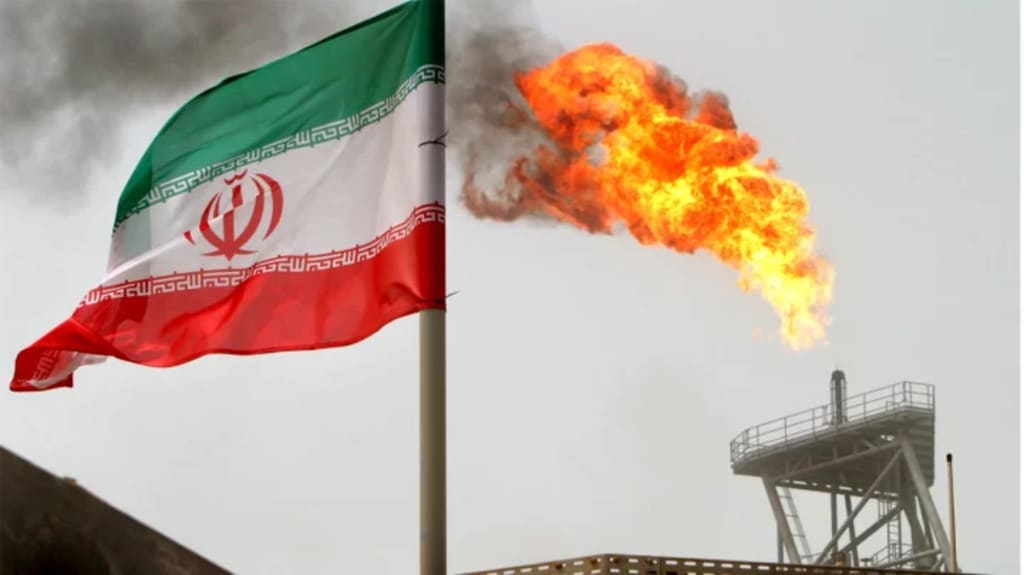Content warning
This story may contain sensitive material or discuss topics that some readers may find distressing. Reader discretion is advised. The views and opinions expressed in this story are those of the author and do not necessarily reflect the official policy or position of Vocal.
China is assisting Iran with managing sanctions
World Politics

After Iran went after Israel with more than 300 rockets and robots in mid-April last year, the issue of severe approvals on Tehran's oil sends returned into the conversation. The country's economy is reliant upon oil.
Iran's oil sends hit a six-year high in the initial four months of 2024, regardless of a progression of measures against Iran. As indicated by Iran's traditions boss, the sum is 35.8 billion US dollars. Yet, how is Iran ready to sidestep sanctions on its oil sends out?
The response lies in the exchange system of its greatest client, China, which represents 80% of Iran's all-out oil trades. As indicated by a report by the US House Monetary Administrations Board of Trustees, Iran sends out around 1.5 million barrels of oil to China consistently.
For what reason does China purchase oil from Iran?
There are significant dangers of exchange with Iran, particularly where there are different authorizations of the US, yet at the same time, for what reason does China, the world's biggest purchaser, purchase oil from Iran? The explanation is extremely straightforward, Iranian oil is great and modest. Because of different global contentions, the cost of oil keeps on ascending on the planet, however since the restricted Iran is frantic to sell their oil, they offer it at a lower cost than others.
The worldwide benchmark for unrefined petroleum fluctuates, however is by and large beneath $90 per barrel. Humayun Falakshahi, senior examiner at information and investigation firm KPLR, said Iran is selling its unrefined petroleum for five bucks for every barrel. Falakshahi believes that the entire matter has an international perspective.
He said that Iran is a piece of the major event between China and the US. By supporting Iran's economy, China is representing an international and military test to the US in the Center East, particularly as strains with Israel proceed. Iran sends out the vast majority of its oil to the Chinese market.
Refinement in tea kettles
Experts accept Iran and China have fostered a refined technique throughout the years to import and produce Tehran's restricted oil. Maia Nikoladz, associate overseer of monetary statecraft at the Atlantic Committee, let the BBC know that the principal instruments of this exchange methodology are Chinese tea kettles (little autonomous processing plants), 'dull armada' big haulers and China's local keeps money with minimal global openness. These 'tea kettles' wherein Iran's oil is refined, are tiny in size and to some degree self-managed, they are utilized as an option in contrast to the tremendous state-controlled processing plants.
Falakshahi made sense of that since processing plants seem to be teacups, they have exceptionally normal offices, and the greater part of them are situated in the Shandong district, southeast of Beijing. These more modest processing plants present less gamble to China, as the state-controlled organizations work universally and approach the US monetary framework. Little confidential processing plants are not worked external to the nation, don't exchange dollars, and don't need unfamiliar financing.
Dull Armada
Nikoladz said oil big haulers are followed adrift all over the planet, with different programming checking their situation, speed, and course. To keep away from this following, Iran and China utilize a dark exclusive organization of big haulers that don't show definite areas. Accordingly, they don't need to fall under the Western approaches and authorities.
These 'dull armadas' typically switch off their Programmed ID Frameworks (AIS) while conveying oil to abstain from being distinguished or cheating by showing their situation starting with one spot and then onto the next.
Falakshahi said this oil trade is more in the waters of Southeast Asia. There is a district east of Malaysia and Singapore, where numerous big haulers have generally moved in one spot and shipped freight between them.
A subsequent boat came from Malaysian waters toward the upper east of China and conveyed oil. By this, it appears to be that this raw petroleum didn't come from Iran yet from Malaysia.
little bank
Rather than the global exchange framework that the West notices, exchanges between China and Iran are directed through little Chinese banks. China is completely mindful of the dangers of purchasing oil from Iran under sanctions, which is the reason it would rather not include significant banks in the exchange.
Iran is additionally accepted to have been paid in Chinese cash for the oil, bypassing the dollar-controlled monetary framework. The cash was paid into Chinese financial balances with connections to Iranian specialists. That cash is then used to import Chinese products and the rest returns to Iran. As indicated by certain reports, Iran utilizes 'cash trades' inside its own country to eliminate hints of where the cash is coming from.
Falakshahi feels that in this situation, Washington isn't keen on utilizing every one of their techniques. Since the primary objective of the Biden organization isn't to build the cost of fuel in their country. Subject matter authorities agree, that if this creation and transportation is disturbed, the cost of oil might rise globally.
About the Creator
Anis Ahmed Siddeque
Hello, I am a professional Article writer. Before article writing was my hobby. On many social sites, I published various blogs and articles. Now, I have decided that the Article is a nice carrier. Before death, I want to earn money.






Comments
There are no comments for this story
Be the first to respond and start the conversation.